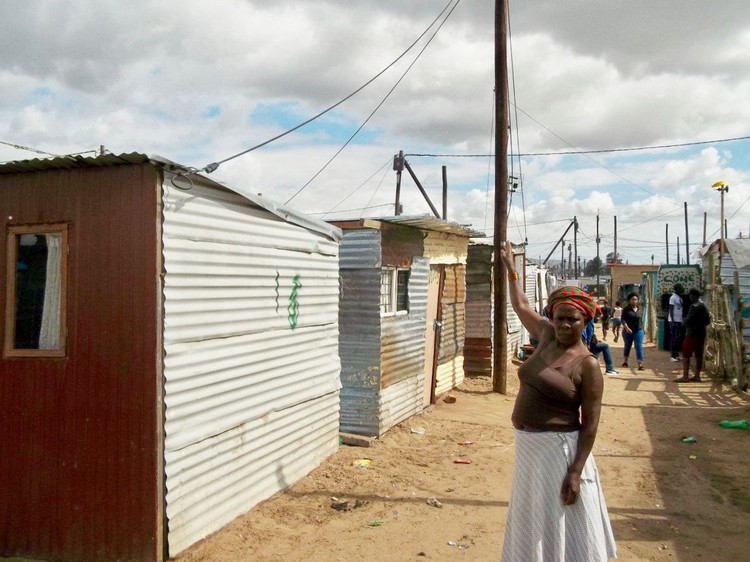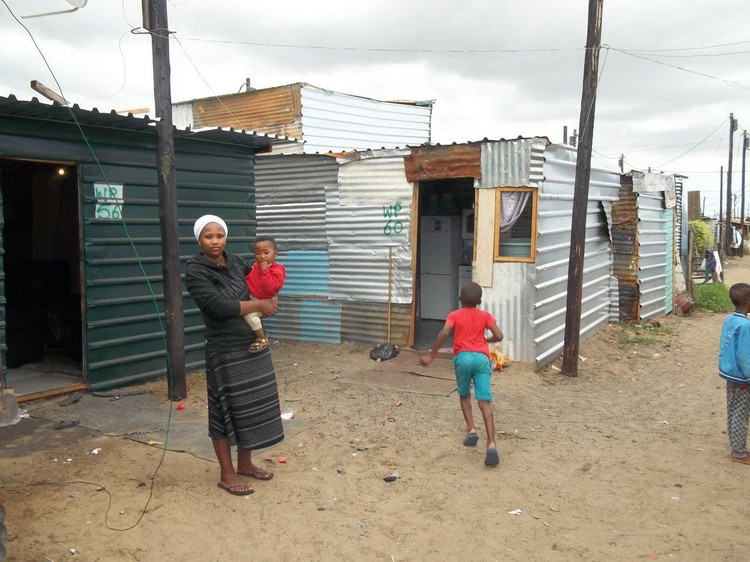
Thandiwe Mzanywa’s shack survived the fire, but the electricity cables to her box were damaged. Photo: Vincent Lali
13 April 2018
Victims of a shack fire in mid-February in Wallacedene, Kraaifontein, say they are struggling since their electricity boxes and cables went up in the blaze. The fire destroyed twelve shacks and damaged cables transmitting electricity to one shack which escaped the flames.
The shack dwellers say they lost most of their belongings, including furniture, beds, television sets, clothing, school uniforms and appliances such as fridges. The loss of their electricity boxes has been a major blow and is making recovery hard.
Thandiwe Mzanywa’s shack survived, but the electricity cables to her box were damaged.
“Because I don’t have my own [working electrical] box, I no longer get free electricity [allowance]. That gift of electricity plays a crucial role for someone who is poor like me,” she says.
Mzanywa does domestic work three days a week. She lives with her grandchildren, aged six and eight. She now pays her neighbour R50 per week to draw electricity to cook and to light her shack. She also pays R20 to store food in the neighbour’s fridge.
“I have to keep lunch food for my grandchildren, otherwise I will have to give them money to buy food during lunch breaks at school,” she says.

Nkosinathi Mbana pays his neighbour a R100 a week for electricity. When he had his own box he would top up the free electricity allowance with about R70 a month.
Thandiswa Makapela says she used to spend about R100 a month on electricity. Now she spends about R100 a week on paraffin for her stove. She lives with her three children, aged one, six and 11, and she works as a cashier at Checkers in Brackenfell.
“I wake up early and boil water to bathe myself and the children before I go to work and before they leave for school,” she says. “I [can] no longer iron my clothes before I go to work … I cook small amounts of food to save paraffin because it is expensive. I’m a single mother who single-handedly takes care of three children, so I struggle.”
“Sometimes I knock off work at 8pm and arrive home at 9pm. While I’m on my way home, I fret about my children’s safety because they are using candles to illuminate the shack,” she says.
Thembeka Mntuyedwa says that before the fire she used to buy electricity for R50 a month. “Now I fork out R120 monthly to get electricity from my neighbour,” she says. She also had to pay a handyman R200 to set up the illegal connection. The neighbour’s box often trips.
Mntuyedwa works as a cleaner at Pick ’n Pay and supports two children.
“The memory of the fire is still fresh in my mind, so I hate to use candles because they can cause another fire outbreak,” she says.
Eskom officials came to the area after the fire and removed burnt electrical cables. Community leader Thobani Mathole said, “An Eskom official told us that a contractor tasked with electrifying the informal settlement has run out of electricity boxes … The official said the contractor usually has spare boxes to use to help fire victims, but they are finished because fires occur frequently here.”
Eskom spokesperson Thandi Nkonzo said Eskom is still waiting for electric boxes from an insurance company. “The claim has been submitted to the insurance and once it is approved, all the houses will be re-electrified,” she said.